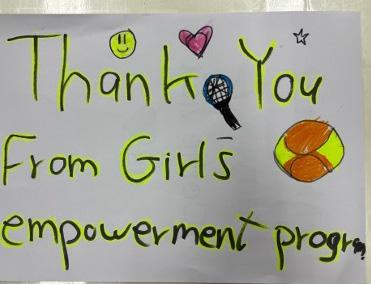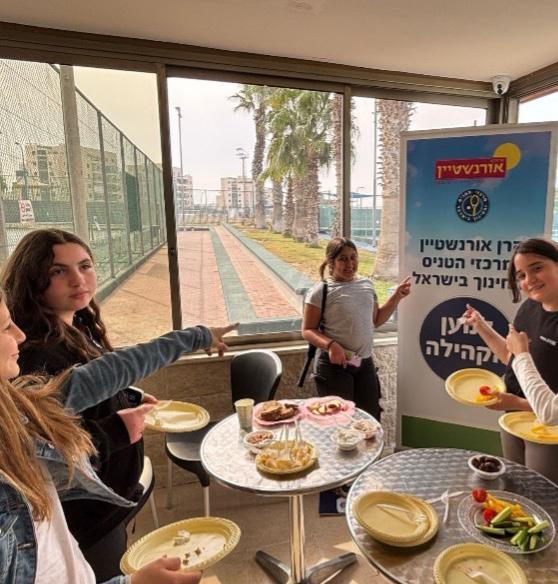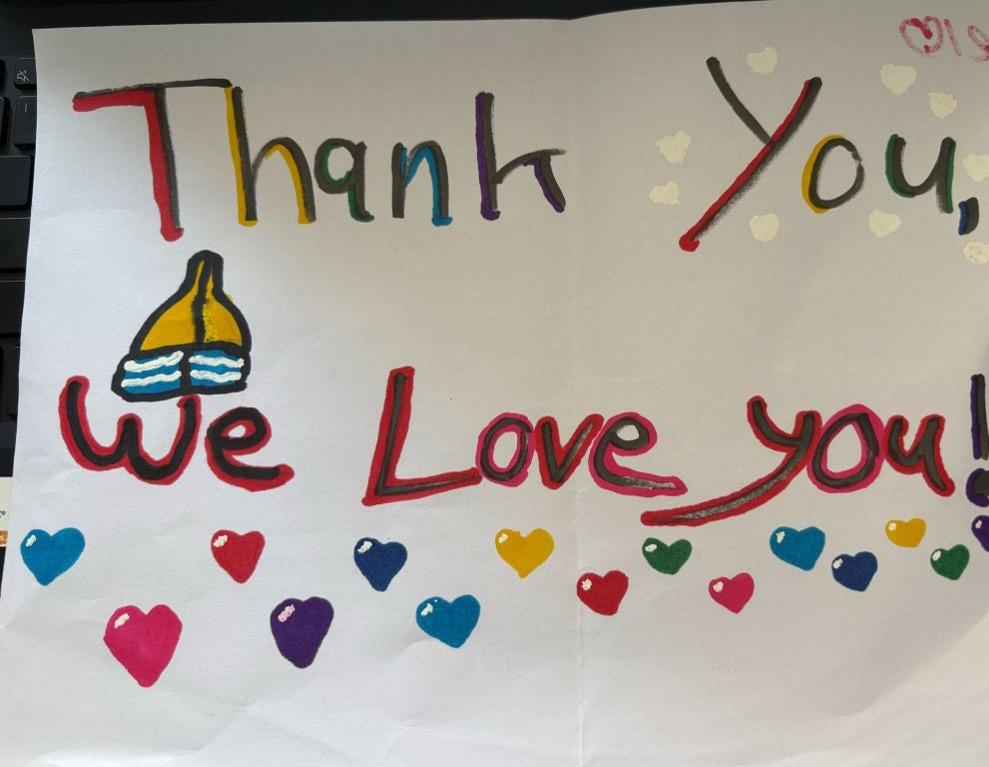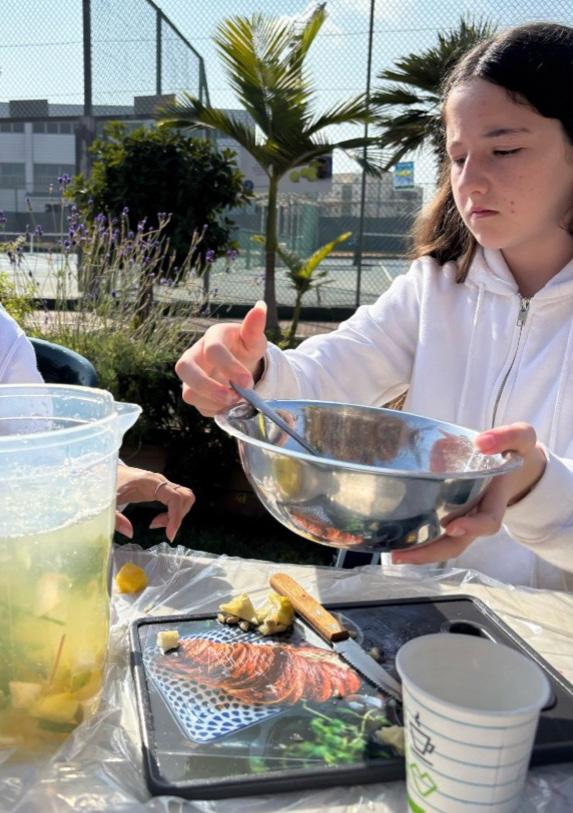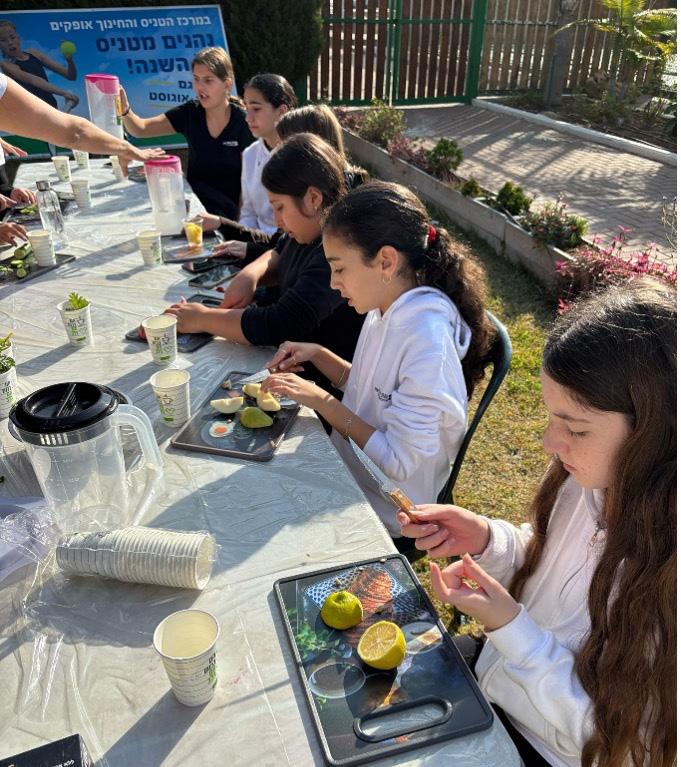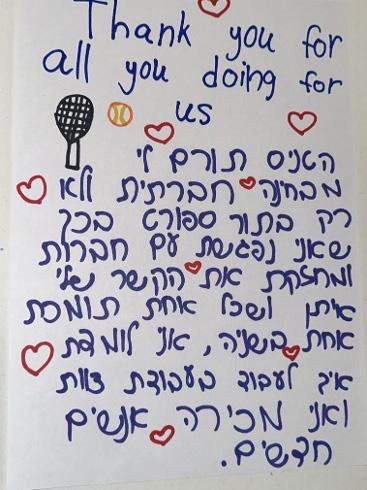Girls’ Empowerment Program Report
Presented with great honor to Joyce Eisenberg-Keefer 2025


Presented with great honor to Joyce Eisenberg-Keefer 2025

Founded in 1976, the Israel Tennis & Education Centers has become one of Israel’s largest social service organizations, providing comprehensive social-emotional, athletic, and recreational programs and support services to youth from historically marginalized communities throughout the country.
Our centers, which span from Kiryat Shmona in the North to Beer Sheva in the South, serve 24 communities. They are open six days a week and welcome more than 10,000 youth annually, ranging in age from preschool to young adulthood. This includes the 1,600 youth we serve in our social-impact programs.
Our vision is a world where every Israeli child’s potential is not just realized but celebrated. We aspire to be the catalysts for positive change fostering lifelong skills, inclusivity, and excellence on and off the court.
Your support is changing lives—giving Israel’s children a sense of belonging, resilience, and hope for a better future. Thank you!
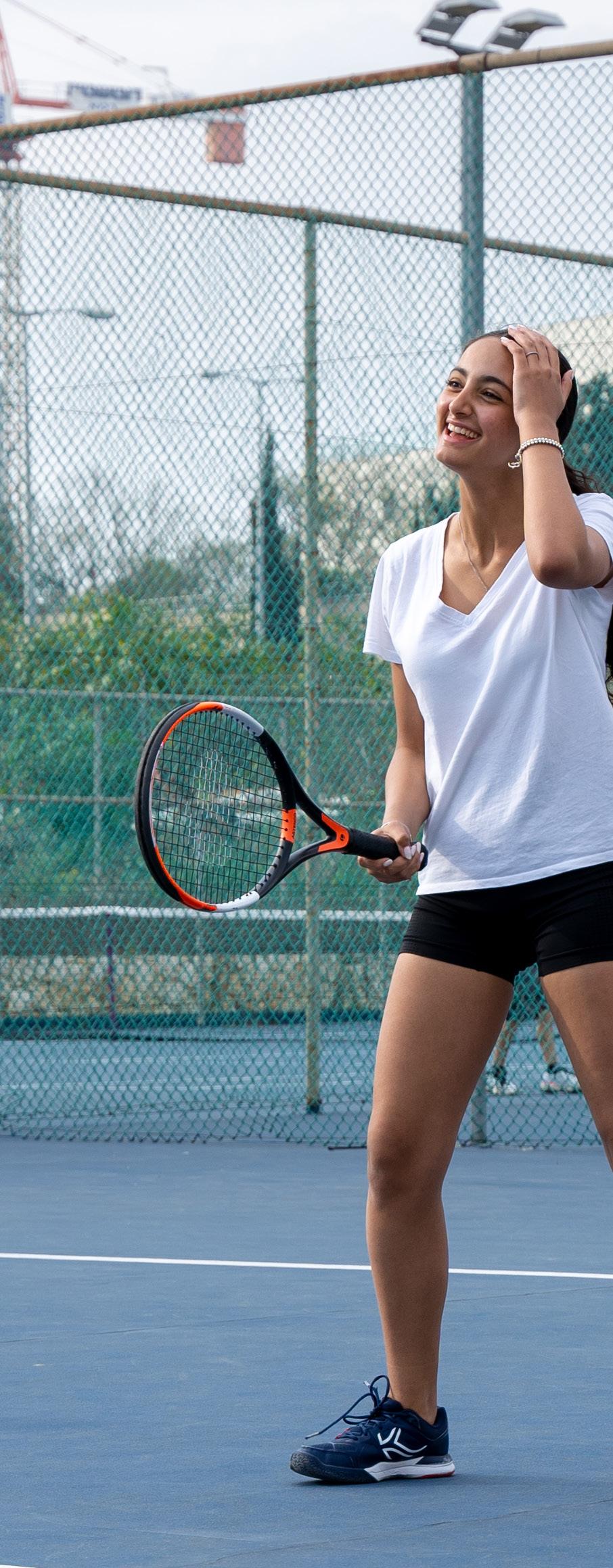
Each girl receives: Bi-weekly tennis training sessions and structured empowerment program led by a professional facilitator
Workshops on crucial life skills, including:
• Body image
• Setting boundaries
• Online safety
• Personal resilience
• Social skills
• Coping with challenges
The stories shared by the participants highlight the profound impact of the program. For many, it provides a much-needed sense of belonging, allowing them to enjoy moments of happiness, form friendships, and acquire tools for a better future.
• Foster a positive group environment and teamwork
• Promote healthy lifestyles and physical activity
• Develop life skills, problem-solving abilities, and effective communication
• Strengthen self-image and confidence through empowerment workshops and tennis training
The program runs throughout the school year, integrating weekly tennis lessons, fitness training, and personal development workshops.
The Girls Empowerment Program supports at-risk girls aged 11 to 14 across 12 Tennis Centers nationwide, with a total of 160 participants.
The program is designed to provide these girls with a safe and structured environment where they can develop essential life skills, build resilience, and
gain a sense of belonging— all through the powerful combination of sports and personal development.
The participants come from challenging and diverse backgrounds and are identified by local welfare departments, municipal education divisions, and the educational staff at the Tennis Centers.
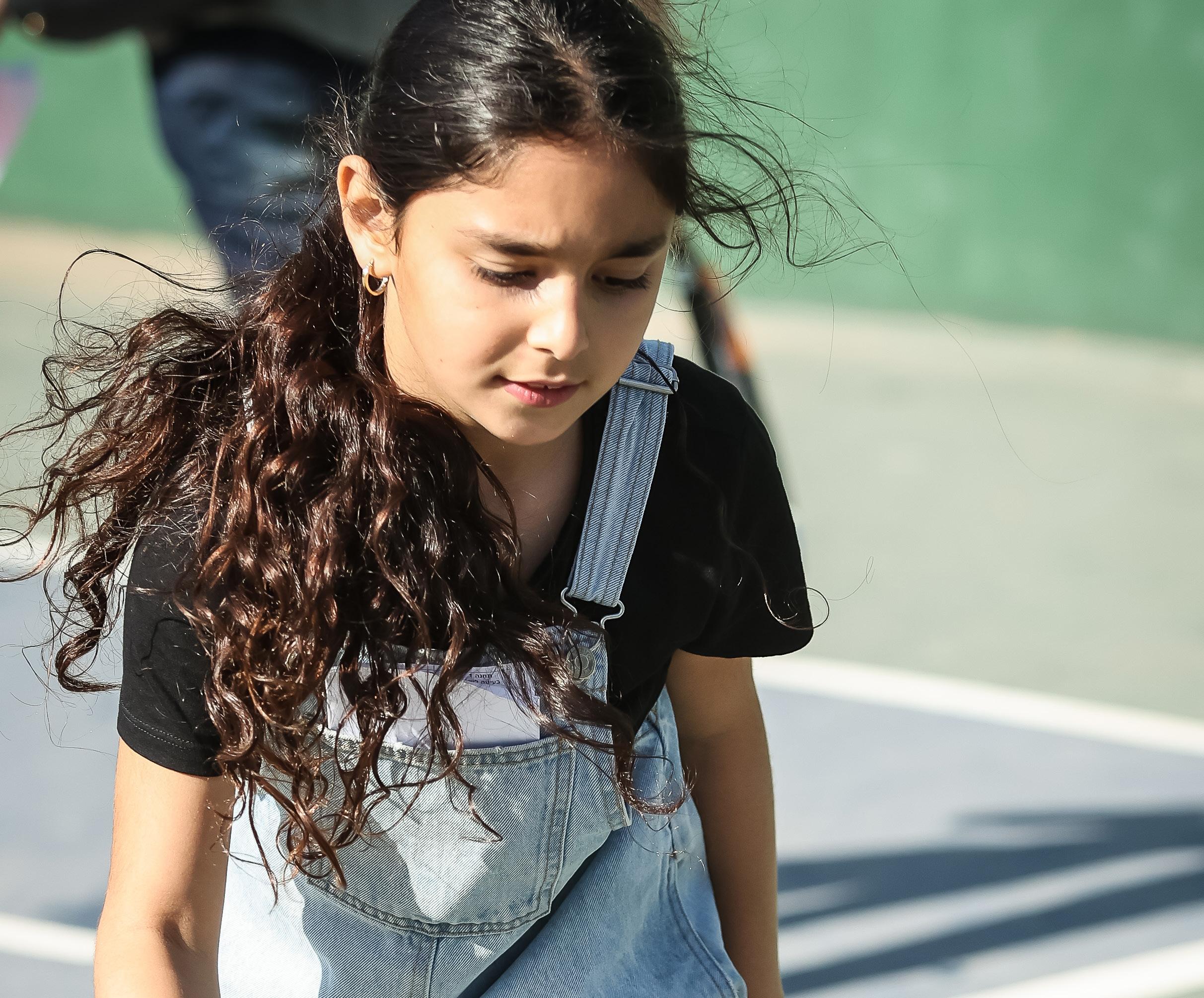
Dear Joyce,
I hope this letter finds you well. I wanted to take a moment to personally thank you for your generosity and support, which are truly transforming the lives of so many young girls in our programs. Since 2018, I have had the privilege of serving as the Director of Education and Social Impact in our organization.
Over the years, I have seen firsthand how the power of sports—especially tennis—can change lives. It’s not just about the game; it’s about confidence, resilience, and creating a future filled with possibilities.
Your support directly impacts our Girls’ Empowerment Program, which provides at-risk girls aged 11 to 14 with a safe space to grow, connect, and develop essential life skills. Across 12 tennis centers nationwide, 165 girls— many from challenging backgrounds— come together twice a week, not only for tennis training but also for meaningful empowerment sessions.
These sessions cover topics that are critical for their development, such as body image, setting boundaries, online safety, and personal resilience. The stories these girls share are nothing short of inspiring. Many of them face daily struggles—economic hardship, social challenges, and emotional burdens. Yet, through this program, they find a sense of belonging, joy, and
strength. Tennis becomes more than a sport; it becomes a bridge to confidence, friendships, and a belief in their own potential.
This past year and a half has been particularly challenging for children in Israel, especially for girls who have endured uncertainty and emotional distress due to the ongoing conflict. Thanks to your generosity, we have been able to offer them stability, mentorship, and a space where they can heal and grow. Many of the families we support cannot afford extracurricular activities, but with your help, we ensure that these girls have access to the opportunities they deserve.
Your extraordinary contributions are life-changing. You are not just supporting a program—you are empowering young girls to dream bigger, to stand taller, and to believe in themselves. The impact you are making will stay with them for a lifetime.
The girls, along with our dedicated team, would love to thank you in person, and we look forward to welcoming you on your next visit to Israel. It would be a privilege to show you firsthand the smiles, determination, and hope that your kindness has made possible.
With deep appreciation,
Shuki Rajman Director of Education & Social Impact
outlines the
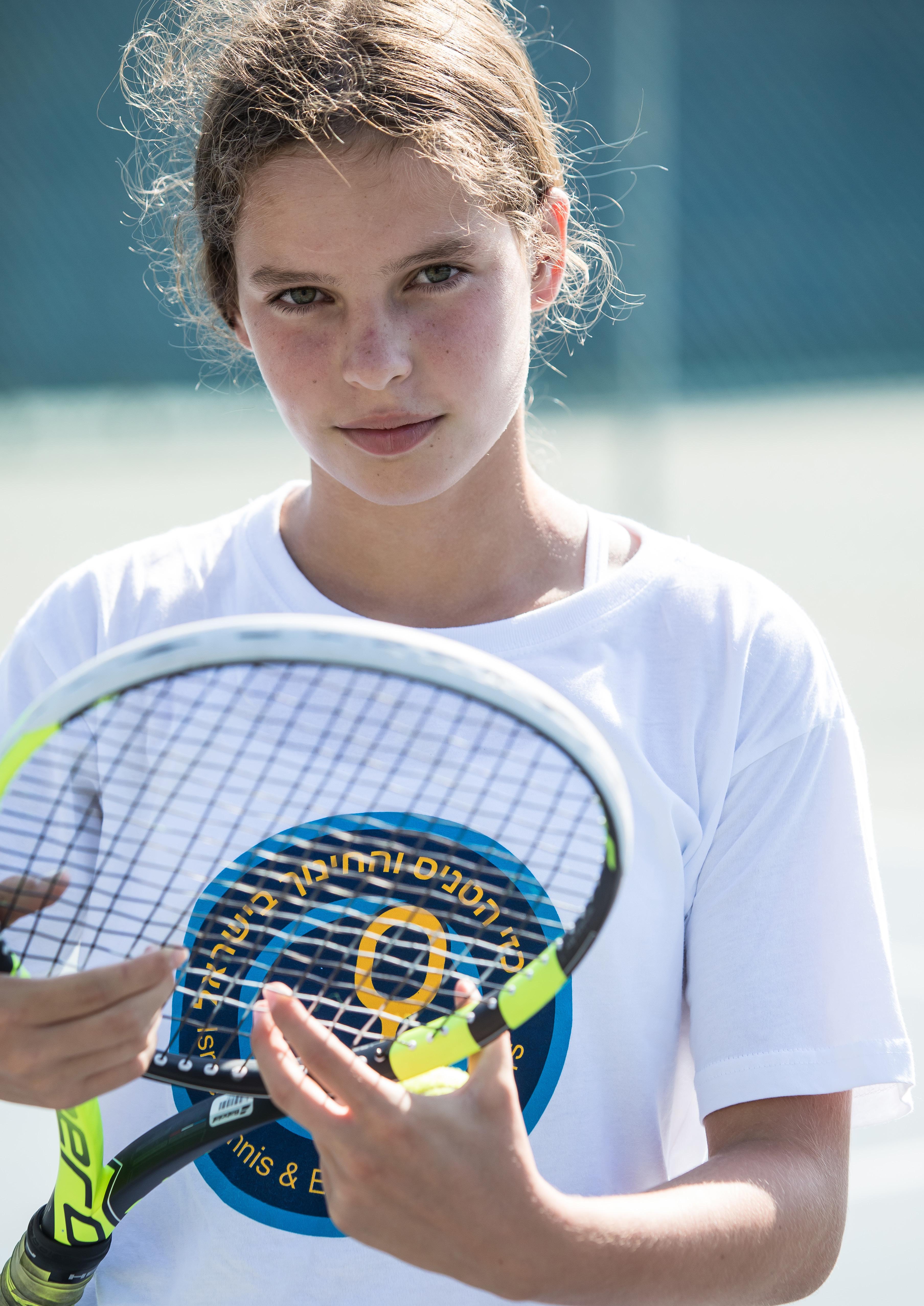
Meeting Topic Activities
Meeting 1 Preparation and Initial Assessment
Meetings 2-5
Personal Resilience in Different Contexts
Meetings 6-9 Self-Image and Body Image
Opening Questionnaire: Understanding personal resilience, self-confidence, and the ability to cope with challenges.
Physical and Mental Resilience: Combining mental and physical activities to develop resilience.
Coping with Failures: Tools for dealing with failure and difficulties.
Stress Management: How to handle stressful situations and maintain mental balance.
Conflict Resolution: How to deal with social and family conflicts.
Body Image in the Media: The impact of media on self-image and body perception.
Physical Changes During Adolescence: Discussion on physical and mental changes during puberty.
Mind-Body Connection: The relationship between physical state and mental/emotional well-being.
Personal Boundaries: How to recognize and set healthy boundaries with others.
Meetings 10-13 Personal Empowerment
Meetings 14-17 Social Skills
Recognizing Personal Strengths: Exercises for self-awareness and understanding individual strengths. People Who Empower Me: Identifying positive influences in one’s surroundings
Building a Personal Vision: Setting personal goals and focusing on future aspirations.
Sharing Personal Experiences: Group discussion about successes and personal challenges.
How to Say ‘No’: Exercises on maintaining personal boundaries and standing up for oneself.
Personal Presentation: Each participant presents a chosen topic.
Healthy Social Relationships: Developing supportive and positive relationships.
Conflict Resolution: Tools for managing conflicts constructively.
Meeting Topic Activities
Identifying Learning Difficulties: Tools to cope with academic and learning challenges.
Meetings 18-21 Coping with Challenges
Meetings 22-25
Summary and Progress Evaluation
Reducing Stress through Mindfulness: Techniques and exercises for relaxation.
Conscious Movement: Improving body awareness through movement.
Additional Relaxation and Stress Reduction Techniques: Exercises to lower anxiety and tension.
Sharing Experiences from the Program: Group discussion on personal insights and growth.
Key Takeaways from the Process: Understanding the personal impact of the program.
Vision for the Future: Setting personal goals moving forward.
Final Questionnaire: Evaluating progress and insights from the program.
This structured syllabus aims to foster personal growth, social skills, resilience, and emotional well-being through a combination of physical activity, discussions, and skill-building exercises.
Dear Joyce,
In August 2024, during a particularly challenging period for the state of Israel and amid a long reserve duty in Judea and Samaria, I received a phone call from the deputy principal of the “Ulpanit” middle school in Tiberias. On the other end of the line, I heard the excited voice of an educator who had experienced the programs at our Tennis Center from the perspective of a mother, as her daughter participated in one of our social impact programs.
“Eran, we must collaborate and create a group at our school as well!” she said. At that time, I was thinking about ways to develop new partnerships and find new collaborators for our girls’ program. To be honest, in my first year as the program coordinator in Tiberias, the girls’ group was quite a challenge, particularly in how the school engaged with us.
For me, the social impact programs— including the Girls’ Empowerment Program—are a tremendous benefit we offer to educational institutions in the cities where our organization operates so I hope that our partners are loyal to the process in return. The moment I got that phone call, I instinctively knew we had found what was missing: a high-quality, supportive partner with professionals who truly care about the girls—just like we do.
A week later, I was already sitting with several professionals from the school, working to tailor the group in the best possible way. I was impressed by their passion to be part of the ITEC Tiberias family and their initiative to bring a meaningful, educational, and value-driven program to girls who truly need it and who will benefit from the process.
And so, a new group was formed with new, caring partners, consisting of 12 talented, high-quality, complex, and energetic girls from 7th and 8th grades. The main goal of the program is to provide them with essential life tools through a combination of sports, physical activity, personal development, and social enrichment.
During the meetings, we create a safe and empowering space where the girls are exposed to inspiring personal stories of those who face similar challenges, discover their unique strengths, and learn how to use them to their fullest.
The program is held every Thursday in a structured and enriching format:
• Tennis Training (45 minutes): During which the girls develop technical skills, physical fitness, and group dynamics. Through tennis, Shiraz— their instructor and guide—teaches them essential life values like respect and care, achievement and
sportsmanship, discipline, and the freedom to be themselves within physical activity.
• Sports Values (45 minutes): A session of discussion and learning on topics such as teamwork, perseverance, determination, coping with failure and success, public speaking—using examples from the world of sports. Despite the challenge of this type of activity (discussion), the lecturer Orly does an excellent job. She doesn’t just “come to work”— she truly cares! This is evident in how she never gives up on the group or the important content she brings them, even when it’s difficult.
• Yoga and Relaxation (45 minutes): Yoga sessions that help with relaxation, mind-body balance, concentration, and flexibility, led by one of the best instructors in northern Israel! The connection was immediate, and the girls eagerly look forward to Elia’s classes.
Each activity is led by experienced, professional, and dedicated instructors who accompany the girls throughout their journey and contribute to their personal and athletic development. The program is not just about sports—it is a significant learning experience that provides the girls with vital tools for success, self-confidence, and a lasting sporting spirit.
So of course, alongside our deep gratitude—words cannot express how much we appreciate you—for giving us the opportunity to offer such a meaningful activity to the girls in our city, it’s important you know: the program is working wonderfully! There are challenges— many—but we will never give up and will always find the right way to reach their hearts.
With great appreciation,
Eran Sabi Community Program Coordinator Tiberias Tennis Center

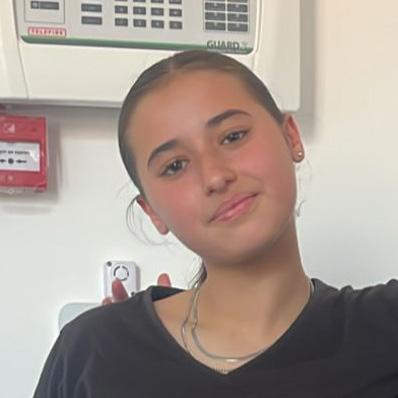
Hila joined the program lacking self-confidence and came to us with significant social challenges. She would hide her face and smile, a sign of the insecurity she was experiencing, and she avoided participating in activities that required interaction with others, like competitions or partner work. Her social difficulties were clear and impossible to ignore—it was evident that she struggled to connect with others.
But over time, the process we began together made a difference. Slowly, we built a relationship of trust with her and began to see meaningful changes in her behavior. At first, Hila would send messages to her counselor almost every week, saying she might not come, explaining she felt she had no friends to participate with and couldn’t find her place. (We were actually happy she felt comfortable enough to share this with us.)
Today, the picture is different, though still a work in progress. Hila now attends every activity, and her progress is evident every time she overcomes her fears and actively participates. The girl who not long ago wouldn’t utter a word and lacked confidence around her peers now chooses not to give up and takes part in discussions and activities. She’s beginning to laugh and be socially present—not just physically present. Of course, the journey is far from over, and the work continues.
The impact of this process hasn’t remained confined to the program. Over time, we learned that the principal of Hila’s school noted the significant improvement in her during the program and that it’s affecting her behavior both at school and at home. Her positive development is visible even outside the field, which fills us with satisfaction and excitement to witness the meaningful transformation she’s undergoing.
Hila is living proof that with support, patience, and hard work, one can overcome challenges and discover abilities they never knew they had.

Emunah is one of the standout participants in our program. She is highly advanced athletically compared to the other girls, and her strength is evident not just on the field—she brings light and energy to the group.
No matter what kind of day she’s had, Emunah always arrives with a smile and full of energy, despite the personal hardships she faces. At first, we weren’t aware of the many challenges she was dealing with in her day-today life. She showed up to every session with a wide smile and managed to hide what was in her heart.
When a fee was introduced for participation in the program, we discovered that Emunah was the only one who hadn’t paid until the very last moment. Still, she never asked for sympathy or said she “couldn’t afford it.” Each time, she tried to ask her parents for the amount, but they refused due to the financial difficulties at home. We looked into the matter further, and after speaking with Emunah’s mother, we learned the story behind their struggles: they had recently lost both her grandmother and uncle within a short time, which led Emunah to take on responsibility for caring for her siblings and giving up her own free time.
Once we understood the situation, we brought it to the attention of Shuki, the national director of community programs, and with his help, we were able to subsidize Emunah’s participation so that she wouldn’t have to pay. When Emunah’s mother heard this, she came to us with tears in her eyes and thanked us in a choked voice, full of gratitude for our care, support, and attentiveness.
Emunah is a true example of resilience, positivity, and determination. She is a girl who stands out in the program and is constantly growing through it. Every time she comes to practice, she says: “I finally made it—and now I can breathe a little.” There’s no better feeling than that—seeing her flourish, grow, and feel that someone here truly cares. The satisfaction we feel as we witness her development is beyond words.
